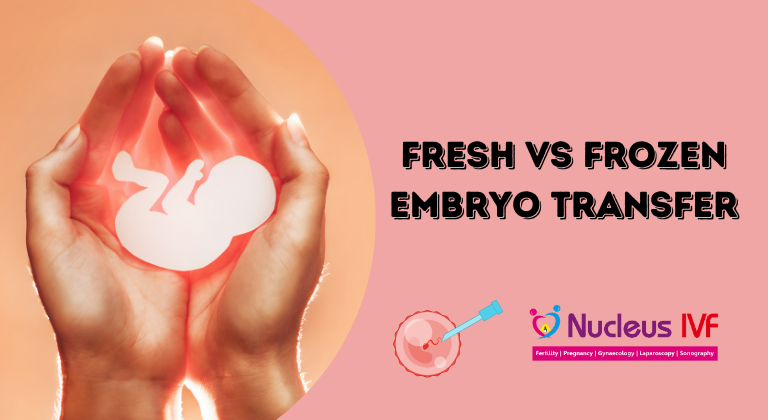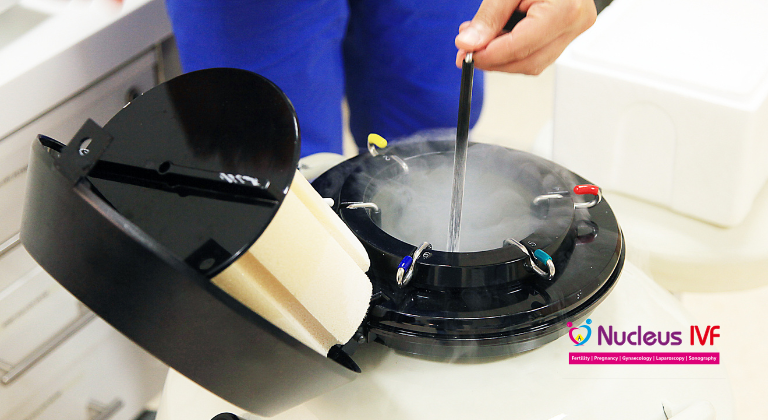When undergoing IVF (In Vitro Fertilization), one of the most critical decisions is whether to opt for a fresh embryo transfer or a frozen embryo transfer (FET). Both methods have helped countless couples achieve successful pregnancies, but they differ in timing, hormone balance, success rates, and clinical strategy.

At Nucleus IVF in Wakad, Pune, under the expert guidance of Dr. Pritam Sulakhe, patients receive personalized IVF plans based on medical history, age, and embryo quality. In this blog, we’ll explore the difference between fresh and frozen embryo transfer in detail to help you understand which may be the best for your fertility journey.
What Is a Fresh Embryo Transfer?
A fresh embryo transfer involves placing an embryo into the uterus within 3 to 5 days after egg retrieval and fertilization.
Key Characteristics:
No freezing involved
Transfer happens in the same cycle as ovarian stimulation
Typically occurs on Day 3 or Day 5
Benefits:
Quicker process: You don’t need to wait an extra cycle
Good for younger women with regular cycles
Less lab handling: Embryos go directly from culture to uterus
Disadvantages:
Hormonal overload: High estrogen during stimulation may affect uterine lining
May reduce implantation rate in some women
Less time for genetic testing (like PGT)
What Is a Frozen Embryo Transfer (FET)?
In a frozen embryo transfer, embryos are frozen (cryopreserved) after fertilization and transferred in a later cycle when the uterus is optimally prepared.
Key Characteristics:
Embryos are vitrified (frozen at high speed)
Transfer occurs in a different menstrual cycle
Hormonal or natural preparation can be used
Benefits:
More control: Doctors can optimize the uterine environment
Time for genetic testing (PGT, PGD)
Better implantation rate in hormone-balanced cycles
Less risk of OHSS (Ovarian Hyperstimulation Syndrome)
Disadvantages:
Longer treatment timeline
Slight chance of embryo loss during thawing (very low with modern vitrification)

Fresh vs Frozen Embryo Transfer: Key Differences
| Factor | Fresh Transfer | Frozen Transfer |
|---|---|---|
| Timing | Same cycle | Later cycle |
| Uterine Environment | Affected by stimulation drugs | More natural/hormone controlled |
| Genetic Testing | Limited or not possible | Ample time for testing |
| Risk of OHSS | Higher | Lower |
| Convenience | Shorter time | More planning involved |
| Success Rate | Varies | Generally higher in many cases |
Which Has Higher IVF Success Rate?
Studies have shown that for many women, especially those with PCOS, irregular ovulation, or high hormone levels, frozen embryo transfers offer better outcomes. However, success depends on multiple factors:
Age of the woman
Embryo quality
Uterine lining condition
Presence of underlying health issues
Dr. Pritam Sulakhe recommends a personalized approach after thorough evaluation.
✨ At Nucleus IVF, we carefully assess hormonal levels, uterine health, and embryo viability before recommending the transfer type.
How Are Embryos Frozen?
Embryos are frozen using vitrification, a rapid freezing process that prevents ice crystal formation, ensuring over 95% embryo survival during thawing.
When Is Fresh Embryo Transfer Preferred?
Young women with good ovarian reserve
Regular cycles with minimal hormone response
Urgent fertility treatment due to age or travel plans
When Is Frozen Embryo Transfer Preferred?
History of failed fresh transfers
Risk of OHSS
Abnormal hormone levels in fresh cycle
Planning for PGT (Preimplantation Genetic Testing)
What Patients Say at Nucleus IVF Pune
Many couples at Nucleus IVF Wakad have found success through frozen embryo transfers, especially when earlier fresh cycles were unsuccessful. Patient satisfaction is often higher due to reduced physical stress and better hormone balance.
Final Thoughts
Both fresh and frozen embryo transfers have their pros and cons. What works best for one patient may not work for another. The key is individualized IVF planning under expert guidance.
At Nucleus IVF Pune, our team, led by Dr. Pritam Sulakhe, ensures you get a fertility treatment strategy that maximizes your chance of pregnancy and minimizes complications.
✉️ Want to know which IVF method is right for you? Book a consultation at Nucleus IVF in Wakad today. Your dream of parenthood deserves a personalized, expert-backed plan.
Dr. Pritam Prakash Sulakhe
Dr. Pritam Prakash Sulakhe
author
Dr. Pritam Prakash Sulakhe has completed his MBBS from B J Government Medical College , Pune which is one of the top medical College in India. He continued his post-graduation as DGO at same institute. After that he opted for Diplomat Of national Board In Obstetrics and Gynecology from Kerala Institute Of Medical Sciences Trivandrum, which is one of the most prestigious institute from South India.


